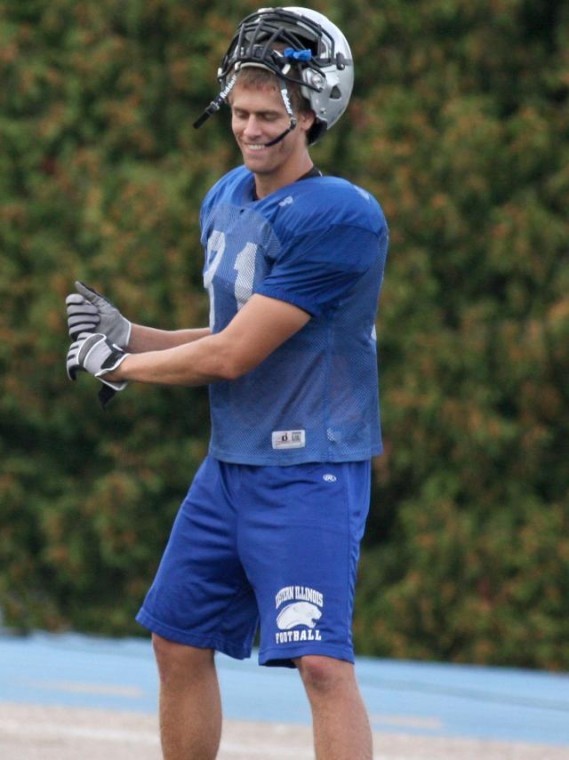Feature Photo: Evolution of a touchdown dance
I was in the middle of unpacking boxes on Friday when two Mormon boys came knocking on my apartment door. Most people would find this an annoying distraction, if not an imposition, but I’ll admit feeling a sense of giddiness when I opened the door to two very young men named Elder.
No two groups of people more enjoy discussing religion than the deeply religious and the deeply irreligious and, being in the latter camp, I relish the opportunity to talk God with members of the former. After I informed my guests that they were speaking with a devout atheist, they pressed ever further and I had to admire their pluck.
“If there is a God, would it matter if he loved you?” asked the more vocal Elder.
“No, not for me,” I said. “I have real people in my life who love me for who I am and what I do. Most of them are quite a bit less wrathful and vindictive than the God of the Old Testament. Though, if there is a God, I think He should be free to love whomever He wants.”
I then asked the less talkative Elder, who was black, if it bothered him that the Book of Mormon says God marked the sinning, exiled Israelites with darker skin. Joseph Smith, the charismatic founder of the church who lived and was eventually murdered in Illinois, believed the Native Americans to be these cast away Hebrews.
I told him I found the idea that darker skin was a punishment from God to be repugnant and wondered how he settled that within himself.
“No, it wasn’t a punishment,” he corrected me. “There was a great war between believers and non-believers, and God marked the non-believers so the believers could tell them apart.”
“A great war between believers and non-believers? Do you really believe this happened?” I asked, astonished.
“Yes, of course,” he said.
“And where did you learn about this great war?”
“The Book of Mormon.”
“You both believe that a great war happened between believers and non-believers that historians have written nothing about, even though we have historical accounts of even minor battles going back thousands of years, because it’s in the Book of Mormon?” I asked.
“Yes,” said the other Elder. “How does it make you feel that we believe that?”
This was a fine question, rather more journalistic than prosthelytizing.
I first said “disappointed,” but quickly conceded it was the wrong word-who am I, after all, to be disappointed in these two young men who are working hard for what they believe in.
“Mystified,” I resolved, “and troubled. History is full of wars between people of different ideological views. I like to think we collectively look back on those wars with disgust. I know many non-believers and can safely say not a single one would ever kill a person for their religious beliefs. That you both believe this war happened and that the God who let it happen is brimming with love is mystifying and troubling.”
My guests both seemed to roll this around in their heads for a bit. Again, to their credit, these young men listened to my heathenism respectfully and intently. That said, it was they who showed up at my door.
“Have you tried prayer?” one finally asked.
I realized we had conflicting agendas and decided to go for a settlement.
“I’ll make you a deal,” I said. “I will go to my room right now and pray for God’s guidance. All I ask is that you try going a day without prayer. It doesn’t have to be today, doesn’t have to be tomorrow. Just some day, or even some hour, try walking in a world without God. I promise it’s quite beautiful.”
This was a deal neither Elder was willing to make. Sensing this conversion wasn’t going to go any better, my guests politely thanked me for my time and trudged onward.
Atheists are the group least trusted by the American public, according to just about every poll that has ever posed the question. We tend to be good, compassionate and thoughtful people who see meaning and beauty just about everywhere. But the idea that someone doesn’t believe in God so repulses some people that it can be discouraging to discuss our opinions.
I myself am guilty of not fully expressing my opinions on religious matters in my columns out of a fear that it may blind some readers to my larger argument. I’m not aiming to disabuse anyone of their beliefs; I understand the deep meaning religion has for many people.
But there are deeper questions we must be willing to ask about religious beliefs that we too quickly shy away from. There are two presidential candidates who are Mormons, Mitt Romney and John Huntsmen. The rest are Evangelical Christians in the deepest, most literal sense.
What fictional histories, what great wars or creation myths or prejudiced decrees from up high do these candidates believe as literal truth?
There is no other area of life where our society would hesitate to grill presidential candidates on such unfounded assertions. But, for whatever reason, a candidate’s religious beliefs are not only given a free pass, but also given an air of credence and credibility.
I do not expect debate moderators or mainstream journalists will challenge these unfounded beliefs. But I would like to think the voting public can ask the supposed elder statesmen (or stateswomen) the same questions I asked the two Elders at my door and expect, if not demand, a straight answer.
Dave Balson is a senior journalism major.
He can be reached at 581-2812 or
DENopinions@gmail.com.
Feature Photo: Evolution of a touchdown dance
Wide receiver Chris Wright does a dance while waiting for a play to run Tuesday during football practice at O’Brien Stadium. The Panthers will open the regular season at home Thursday in a game against ISU at 6:30 p.m. (Kimberly Foster






































































